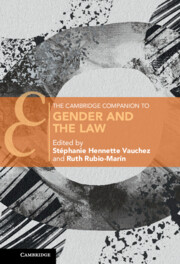Book contents
10 - The Political Subject
from Part III - Communities
Published online by Cambridge University Press: 19 January 2023
Summary
What is the ‘political’? What rights, prerogatives and duties turn a person into a political subject? And to what extent is a gendered order, or are other systems of hierarchies contained in the legal definition of the political subject? The right to vote immediately comes to mind as an obvious candidate for illustrating this particular dimension of political rights, for it is well-established that, historically and across a wide range of countries, the very definitions of citizenship as a legal category has been based on the exclusion of a number of categories of people. Women were of course one of these categories, but also others who failed to fit the dominant model of the rational and independent (male) individual that classical political philosophy as well as modern legal systems had consolidated and promoted by the end of the eighteenth century. While this chapter addresses the right to vote as a crucial dimension of the legal construction of ‘the political subject’, it also adopts a wider perspective. This is achieved by adding a historical dynamic to the inquiry about the scope and contours of what has come to be defined as ‘political’ activity since the end of the eighteenth century (Section 1), and by viewing subsequent developments from the conquest of suffrage to more contemporary participatory rules seeking to challenge the foundational gender order enshrined in the definition of the political subject (Section 2) through a comparative lens.
- Type
- Chapter
- Information
- The Cambridge Companion to Gender and the Law , pp. 336 - 365Publisher: Cambridge University PressPrint publication year: 2023



